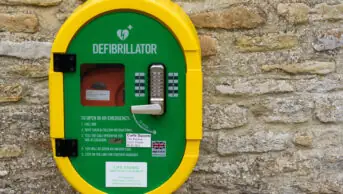
le Moal Olivier / Alamy Stock Photo
In Scotland, we believe pharmacy is, and will continue to develop as, an integral part of the modern NHS.
Our strategy ‘Achieving Excellence in Pharmaceutical Ccare: a Strategy for Scotland’, published in August 2017, emphasises the important role the pharmacy team plays in the NHS Scotland workforce, and how we will make the best use of its specialist skills and much-needed expertise in medicines. It describes how we would like pharmaceutical care to evolve in Scotland, and the crucial contribution of pharmacists and pharmacy technicians, who work together with other health and social care professionals to improve the health of the population, especially for those with multiple long-term and complex conditions.
‘Achieving Excellence’ lists our nine commitments and supporting actions for the next five years. These are as follows:
1. Increasing access to community pharmacy as the first port of call for managing self-limiting illnesses and supporting self-management of stable long-term conditions, in hours and out of hours;
2. Integrating pharmacists with advanced clinical skills and pharmacy technicians in GP practices to improve pharmaceutical care and contribute to the multidisciplinary team;
3. Creating the conditions to transform hospital pharmacy services to deliver world-leading pharmaceutical care;
4. Providing the focus, resources and tools to support the safer use of medicines;
5. Improving the pharmaceutical care of residents in care homes and people being cared for in their own homes;
6. Enhancing access to pharmaceutical care in remote and rural communities;
7. Building the clinical capability and capacity of the pharmacy workforce;
8. Optimising the use of digital information, data and technologies for improved service delivery;
9. Planning for sustainable pharmaceutical care across Scotland.
Our focus in 2018 will be developing our current core services. We will continue to implement the actions identified in our strategy and make progress towards delivering our two key priorities: improving NHS pharmaceutical care; and enabling NHS pharmaceutical care transformation.
Community pharmacy’s role
Community pharmacy already plays an important role in providing NHS pharmaceutical care in Scotland; it provides highly accessible services for people both in hours and out of hours. We want more people to use their local pharmacy as a first port of call, particularly for support in self-managing long-term conditions.
We will continue to make progress towards delivering recommendations for pharmacy published in ‘Pulling together: transforming urgent care for the people of Scotland’ — Sir Lewis Ritchie’s review of out-of-hours services — and we recently invested over £1m in helping NHS Health Boards roll out the Pharmacy First initiative. This enabled community pharmacists to treat additional self-limiting conditions, such as uncomplicated urinary tract infections and impetigo. It has improved access for people who require assessment and treatment, reduced pressure on GP practices and out-of-hours services, and maximised the skills of pharmacists.
We will assist community pharmacies in getting ready to take on enhanced services by targeting the resources we need to get more community pharmacists into training for independent prescribing and advanced clinical skills.
Minor ailments
Our national minor ailment service (MAS) was introduced in 2006 and allowed specific groups of people to access NHS treatment for self-limiting illnesses, such as fungal infections, allergies, and skin conditions, without the need to see a GP. We are currently running an extended MAS pilot in Inverclyde, as part of the New Ways of Working programme, and we expect the pilot to report in 2018. We will use the evaluation to inform any future improvements to the national MAS. An extended MAS could improve access to treatment for a range of uncomplicated illnesses that normally require a prescription. It would more fully utilise the skills of pharmacists, allow them to take a more clinical focus, and reduce demand on our GP practices, and out-of-hours and emergency departments.
Medicines for chronic conditions
We will also strengthen the chronic medication service (CMS) by improving how our community pharmacists provide personalised care for people with stable long-term conditions. As experts in medicines and their use, pharmacists have a crucial role in supporting people to use their medicines to achieve the best clinical outcomes, and a partnership with the patient can help them to manage their healthcare. We know that there is still much to do, particularly while the number of people registering for the CMS continues to increase. We will develop the CMS and enhance pharmacist input by drawing on, for example, pilot work to develop a pharmaceutical care bundle approach for some conditions. We will continue work on the pharmacy care record and introduce an annual pharmacist-led medication review, so that people who would benefit from a more detailed pharmaceutical care plan will be identified in a more systematic way.
Importantly, we will also improve the CMS and pharmacists’ interventions by encouraging more monitoring and prescribing, which builds on the work being undertaken by community pharmacists who provide pharmacist prescribing clinics. In the current service, community pharmacists are limited to making recommendations to GPs about changes to medicines. These improvements will embed community pharmacist-led prescribing clinics in the mainstream. We can begin to enable community pharmacists to play a greater role in managing people with long-term conditions, by prescribing, monitoring and adjusting medicines, working alongside pharmacists in GP practices, GPs, and other members of the multidisciplinary team.
Work continues on widening the secure sharing of electronic information and data, where appropriate, to facilitate informed decision-making and ensure optimal communications with other health and social care services.
Serial prescribing
The current CMS has a serial prescribing and dispensing element — in which the patient is dispensed medication at the pharmacy for a 24- or 48-week period at regular intervals defined on the serial prescription — so we will encourage Health and Social Care Partnerships to maximise the use of community pharmacy in this way and ease the workload on GPs. We will support engagement between GP practices and community pharmacists and provide enablers to embed serial prescribing and dispensing into normal working practice. Using a quality improvement approach, we are undertaking tests of change to explore different processes that will increase the use of serial prescriptions.
Public health
We will also continue to ensure that the Public Health Service, another core element of the NHS services provided in community pharmacies, is delivered to its full potential. It is already making a significant contribution to smoking cessation and access to emergency hormonal contraception. We will build on the valuable public health role of community pharmacists and their teams. The newly formed GP clusters will allow public health priorities to be defined further at the local level.
Pharmacy in general practice and pharmacotherapy services
In primary care, our focus is on building capacity and providing a broader mix of professionals based around GP practices, which will increasingly work in clusters and work closely with social care and voluntary agencies. Through our Primary Care Fund investment in pharmacy, NHS Boards are already being supported to build capacity in GP practices for pharmacists with advanced clinical skills, and those undertaking the training. They are targeting resources towards priority areas at a local level based on patient need.
This work fosters multidisciplinary team-working and strengthens capacity in the primary care team. These pharmacists and technicians are working directly with GP practices to free up GPs and enable them to focus on their role as expert medical generalists.
My vision is for a more integrated way of working; while community pharmacists will take on a larger role in supporting people with stable long-term conditions through our enhanced CMS, practice-based pharmacists will focus on people with more complex needs who may benefit from more comprehensive medication and polypharmacy reviews. Practice-based pharmacists will also ensure pharmaceutical care issues raised by community pharmacies as part of CMS are considered.
We will continue to support NHS Boards to put pharmacy teams into GP practices, and an evaluation, currently underway, will help us understand in greater detail the impact of these models on service delivery, roles, responsibilities and outcomes, and inform options for the future. Our Health and Social Care Delivery Plan outlines our commitment to ensuring every GP practice has access to a pharmacist with advanced clinical skills by 2021.
isThe core service redesign, which will form part of the new GP contract in Scotland, will begin in April 2018. As part of the redesign we will introduce a comprehensive pharmacotherapy service. Over three years we will establish a sustainable pharmacotherapy service within GP practices. This timeline allows us to test the best way to do this, and for new pharmacists and pharmacy technicians to be recruited and trained.
We need a wider pool of qualified pharmacists to provide the pharmacotherapy service; we will increase the number of pharmacist training posts from 170 to 200 per year from 2018–2019, so there is sufficient capacity to deliver the pharmacotherapy service within the proposed timescales.
Our commitment
We have an immediate focus on the role of community pharmacy, and continue to invest in GP practice-based pharmacy. We are fully committed to realising our vision and meeting the commitments outlined in our strategy, as well as a phased implementation of the new pharmacotherapy service.
The successful delivery of our priorities requires a co-ordinated effort across all levels of the service. Along the way, we will continue to place people at the centre of what we do. We are building partnerships to take forward the vision of Achieving Excellence, and deliver improved NHS pharmaceutical care in the communities we serve.


